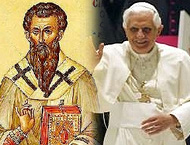Is it possible to have a Catholic theory of literature?
Over the next few weeks I shall try to explore a few different approaches, starting with one suggested by Pope Benedict in his General Audience on St Basil:
"Basil," he said, "was of course also concerned with that chosen portion of the People of God, the youth, society's future. He addressed a Discourse to them on how to benefit from the pagan culture of that time.
He recognized with great balance and openness that examples of virtue can be found in classical Greek and Latin literature. Such examples of upright living can be helpful to young Christians in search of the truth and the correct way of living (cf. Ad Adolescentes 3).
"Therefore, one must take from the texts by classical authors what is suitable and conforms with the truth: thus, with a critical and open approach - it is a question of true and proper "discernment"- young people grow in freedom.
"With the famous image of bees that gather from flowers only what they need to make honey, Basil recommends: "Just as bees can take nectar from flowers, unlike other animals which limit themselves to enjoying their scent and colour, so also from these writings... one can draw some benefit for the spirit. We must use these books, following in all things the example of bees. They do not visit every flower without distinction, nor seek to remove all the nectar from the flowers on which they alight, but only draw from them what they need to make honey, and leave the rest. And if we are wise, we will take from those writings what is appropriate for us, and conforms to the truth, ignoring the rest" (Ad Adolescentes 4).
"Basil recommended above all that young people grow in virtue, in the right way of living: "While the other goods... pass from one to the other as in playing dice, virtue alone is an inalienable good and endures throughout life and after death" (Ad Adolescentes 5).
"Dear brothers and sisters, I think one can say that this Father from long ago also speaks to us and tells us important things.
"In the first place, attentive, critical and creative participation in today's culture.
"Then, social responsibility: this is an age in which, in a globalized world, even people who are physically distant are really our neighbours; therefore, friendship with Christ, the God with the human face.
"And, lastly, knowledge and recognition of God the Creator, the Father of us all: only if we are open to this God, the common Father, can we build a more just and fraternal world."
To read the whole of St Basil's Address to Young Men on the Right Use of Greek [i.e. pagan] Literature click here.


No comments:
Post a Comment